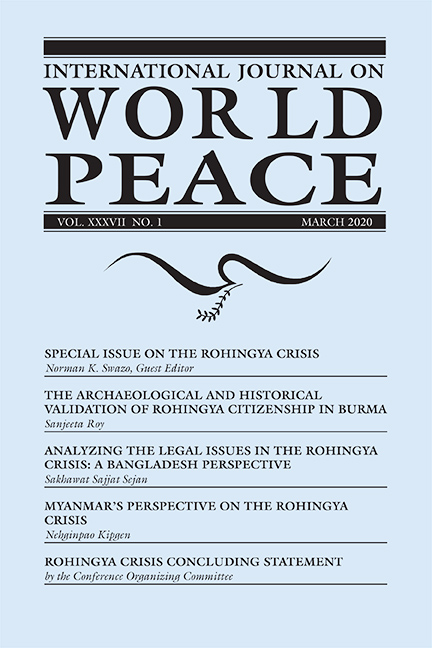Contents
Special Issue on the Rohingya Crisis Norman K. Swazo, Guest Editor 3
"The Archaeological and Historical Validation of Rohingya Citizenship in Burma," Sanjeeta Roy 7
"Analyzing the Legal Issues in the Rohingya Crisis: A Bangladesh Perspective Sakhawat." Sajjat Sejan 23
"Myanmar’s Perspective on the Rohingya Crisis," Nehginpao Kipgen 43
"Rohingya Crisis Concluding Statement by the Conference Organizing Committee," 71
Book Reviews
Cascades of Violence: War, Crime, and Peacebuilding across South Asia. Jeremy Rinker, reviewer 77
Civilizing Torture: An American Tradition, Diana Clark Gill, reviewer 81
Review of Russian Cultural Center Exhibit Commemorating the 80th Anniversary of the 1939 Nazi-Soviet Non-Aggression, Pact TobyTerrar, reviewer 85
This special issue includes four papers that together provide background information on the history of the Rohingya “refugee” crisis, including perspectives accounting for bilateral relations and negotiations between the government of Bangladesh and the government of Myanmar, as well as recommendations related to multilateral engagements such as by UNHCR, regional organizations such as the Association of Southeast Asian Nations (ASEAN), and by diplomatic missions from the USA and China in particular.
Sangeeta Roy’s paper discusses both archaeological and historical evidence in pre-colonial and colonial Burma that provides empirical support for the Rohingya claim of a right to citizenship in present-day Myanmar, even though the government of Myanmar’s post-colonial citizenship laws excluded the Rohingya as a legally recognized ethnic group, therefore denying them citizenship entirely. The Rohingya do not consider themselves “Bengali,” a pejorative term used by Myanmar authorities as they seek to justify the forced displacement of this group of people. To characterize the Rohingya as Bengali is to represent this ethnic group as historically migrating from the West Bengal and the former East Pakistan (what is now the southeastern Bangladesh area), hence to claim they are illegal aliens from the beginning of their migration and should be returned to their places of origin in present-day Bangladesh. Consistent with the Bangladesh government’s position that the Rohingya are forcibly displaced Myanmar nationals (FDMN), Roy’s account affirms the Rohingya narrative of a legitimate self-identity and their claims to citizenship in Myanmar.
The article by Sakhawat Sajjat Sejan analyzes the legal issues of the Rohingya refugee situation in Bangladesh. The government of Bangladesh considers the Rohingya who are now sheltered in the southeast of its territory as (a) forcibly displaced and as (b) Myanmar nationals rather than according them legal status as refugees in the technical sense of the word as it is defined in various instruments of international humanitarian law. To say the Rohingya are nationals of Myanmar leaves the question of their citizenship ambiguous. Bangladesh is not a signatory to the UN Refugee Convention of 1951, in which case, as a matter of negotiation with the government of Myanmar, the government of Bangladesh is on the record insisting that, even though it does not designate the Rohingya as “refugees” nonetheless Myanmar must accept repatriation of the Rohingyas, notwithstanding the unsettled question as to the citizenship status of this ethnic group within Myanmar under national laws that define qualifications for citizenship. As a lower middle-income country as defined by the World Bank, Bangladesh does not have the resources to manage any significant refugee crisis on its own, hence its reliance currently on a significant amount of international humanitarian assistance for the Rohingyas. Sejan takes these facts into account while considering how international law applies to the Rohingya crisis, including what measures are relevant in the case of responding to the evidence of ethnic cleansing and allegations of crimes against humanity and the crime of genocide. The latter allegations are now, of course, matters of legal deliberation at both the International Court of Justice and, in due course, the International Criminal Court.
Nehginpao Kipgen provides a thorough historical overview of the decades-old conflict within Myanmar that has led to the present crisis, even as he fairly summarizes the political perspectives of both the governments of Bangladesh and Myanmar. In particular, Kipgen seeks to clarify the perspective of the Myanmar government, since it is a minority point of view relative to international commentary seeking remedy and sustainable solution to the problem. Kipgen accounts for the fact of a “coordinated strategy” of ethnic cleansing within Myanmar, evident in the actions of State officials, security forces, Rakhine nationalist civil society, and stridently nationalist Buddhist monks fearful of a demographic transition that would increase the number of Muslims in the country, prospectively posing an existential threat to Myanmar’s self-affirmation as a majority Buddhist country. Kipgen accounts for internal political developments in Myanmar, including what he characterizes as the slow pace of incremental democratization in relation to military rule and local armed conflict, the latter occurring consequent to various ethnic groups seeking regional political autonomy and human rights.
Finally, as a gesture of intellectual solidarity with those who presented in the parallel sessions of the Conference, and to further its aims and objectives to heighten the visibility of this regional problem, we include here the “Concluding Statement by the Conference Organizing Committee of North South University” as it was presented at the closing session of the conference on 28 July 2019. Important in this statement in its summary of “challenges” and considered “sustainable solutions” is the commitment to the principles of non-refoulement and the responsibility to protect persons rendered stateless due to armed conflict and forced displacement. In this respect, the sponsors of the international conference are to be commended for undertaking this very important opportunity for peace-building dialogue on the unresolved Rohingya crisis in Bangladesh.
Norman K. Swazo Guest Editor






